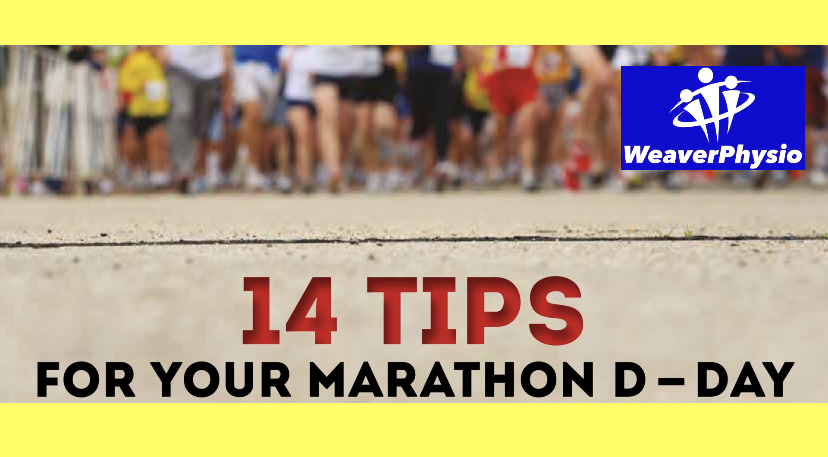14 ESSENTIAL MARATHON DAY TIPS
Expert Advice from Weaver Physio to Help You Cross the Finish Line Strong

Running a marathon is one of the most rewarding yet demanding physical achievements. At Weaver Physio, we understand the preparation, both mental and physical, that goes into race day. Whether it’s your first marathon or your fifteenth, these 14 expert tips will help you stay calm, perform at your best, and enjoy every stride.
1. Taper Effectively
Tapering involves reducing your training volume and intensity in the final weeks leading up to your marathon. This helps your muscles recover fully and primes your body to perform at its peak. Studies recommend reducing mileage by 30% in the penultimate week and running just 30% of your weekly distance in the final four days. For the last three days, limit your runs to 2–5km per day to keep the legs moving without fatigue.
2. Set Your Race Pace
Use shorter training races to estimate your marathon pace. Once you have a target finish time, calculate your split times at key checkpoints (1km, 8km, 10km, 16km, 32km). These markers keep you on track during the race and provide a mental strategy to manage your effort.
3. Carbohydrate Load Properly
Carb loading is critical for endurance. Three days before your race, consume 500–600g of complex carbohydrates daily—consider using a carbohydrate-loading drink to help meet this target. Eat a carbohydrate-rich breakfast on race morning and consume gels or energy drinks during the marathon. Always trial these nutrition strategies during training to avoid gastrointestinal issues.
4. Mentally Prepare
Mental fatigue can be as limiting as physical fatigue. Long training runs are essential not just for fitness but to build belief in your endurance. The brain (your “central governor”) can override muscle capacity if it perceives excessive strain. Build confidence in training to pre-program your brain for success on race day.
5. Familiarise Yourself with the Course
Drive or study the race route in advance. Knowing where the hills and descents lie—especially in the final 12km—can help you mentally prepare and break the race into manageable chunks. Visualise these sections to reduce anxiety and improve pacing.
6. Eat Well the Day Before
The night before the race, eat meals high in complex carbohydrates to maximise glycogen stores in your liver and muscles. Avoid unfamiliar or heavy meals that may cause digestive issues.
7. Prepare Your Kit in Advance
Lay out all your race essentials the night before: running shoes, comfortable clothing, socks, and nutrition. Don’t wear new gear on race day—stick with what you’ve tested in training. If using an energy belt, make sure you’ve trained with it for comfort and convenience.
8. Prioritise Rest
Avoid unnecessary walking or standing the day before the marathon. Conserve your energy by resting, reading, or watching a film. Your legs need to be fresh and recovered.
9. Dress for the Weather
Overdressing or underdressing can cost you energy. Wear layers if the weather is cold—an old T-shirt or bin liner can be discarded once you warm up. If rain is forecast, wear a waterproof top to avoid heat loss, especially in windy conditions. Women and lean runners are at higher risk of hypothermia.
10. Start the Day Right
Wake up calmly and avoid harsh alarm clocks. Begin with a warm drink, deep breathing, and positive affirmations. Eat a light breakfast 2–3 hours before the race with easy-to-digest carbs like toast, cereal, or honey. Avoid overthinking the race early in the day—stay relaxed and positive.
11. Get to the Start Line Early
Marathon starts can be crowded and chaotic. Arrive early so you know where to go and have time to settle. Large packs may push you into an uncomfortable pace initially—use the first 2–3km to warm up and settle into your planned rhythm.
12. Stay Hydrated—Smartly
Hydration is essential, but overhydration can be dangerous. Aim to drink 400–800ml of a carbohydrate-electrolyte drink per hour, adjusting based on your size and pace. Slower runners may only need 200–400ml per hour. Hydration helps prevent dehydration and low blood sugar—but avoid excessive water intake which can lead to hyponatraemia.
13. Recover Properly Post-Race
Rehydrate as soon as possible after the race to restore fluid and salt levels. Fast runners may be more dehydrated and should drink more immediately. Slower runners often hydrate adequately during the race but still need to monitor urine output—if you’re not urinating within six hours, seek medical attention. Eat a balanced meal to replenish glycogen even if your appetite is low.
14. Celebrate the Journey
Above all, enjoy the experience. A marathon is more than just a race—it’s the celebration of your training, commitment, and resilience. Take in the atmosphere, encourage fellow runners, and savour the achievement. Every finisher has a story worth celebrating.
Your Race. Your Victory. Backed by Weaver Physio.
At Weaver Physio, we support runners throughout Cheshire with injury prevention, gait analysis, sports massage, and rehabilitation. Whether you’re preparing for your first marathon or chasing a new PB, our expert physiotherapists help you move better, run stronger, and recover faster.
Book your appointment today and run your best race—pain-free and well-prepared.
👉 http://www.weaverphysio.com
📍 Northwich, Cheshire – Trusted Running Injury Specialists
#MarathonTips #RaceDayPrep #WeaverPhysio #RunningInjurySpecialist #CheshirePhysio #MarathonReady #TaperSmart #FuelYourRun #RunStronger #MarathonTraining #SportsPhysio #HydrationMatters #RunningRecovery #NorthwichPhysio #PhysiotherapyForRunners #RunCheshire #PainFreeRunning #MarathonMindset #RunToWin #MarathonChecklist













